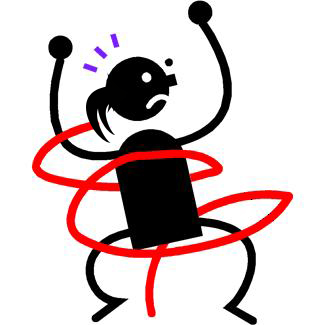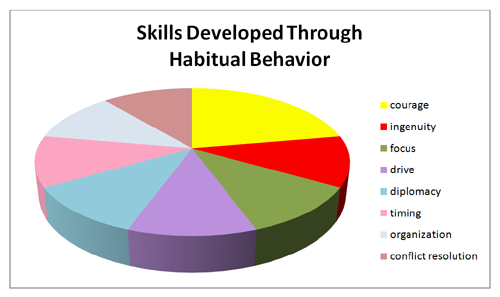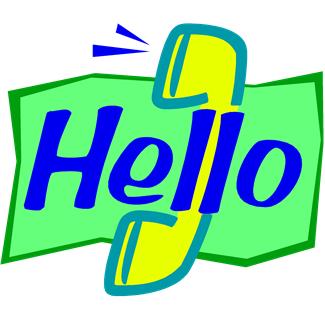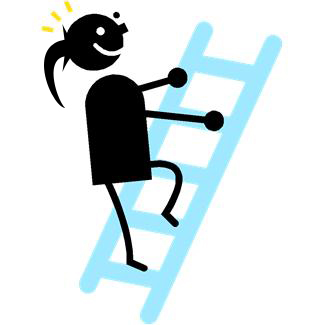Habitual Behavior Develops Valuable Skills
HABITUAL BEHAVIOR DEVELOPS VALUABLE SKILLS: WANT TO REPLACE A HABIT? (ISSUE 104)
By Diane Gold
We all exhibit habitual behavior. We have developed valuable skills as a result of by the very nature of carrying out our habitual acts. We create an expertise in order to do what it takes to get our reward of choice; we repeat and complete and do it again. This prowess builds in us proficiencies which can translate into positive action in our home life, our work productivity and our own creative projects, even if our habitual behavior is not supportive of our own lives. When we choose to replace our habit with one that is positive to our lives, we already have lots of worthwhile skills to make the change and to accompany us on our journey. And when we have a new and healthy habit; the skills we have shaped will remain!
WHAT IS HABITUAL BEHAVIOR?
 Let’s define habitual behavior as a pattern of action that follows an emotional and/or physical craving that leads to some type of internal intake or ingestion, tick, movement, series of actions, that takes place several times a day, once daily or several times a week, and that, when removed without replacement, causes psychic or physical reaction that can be severely painful. When we change the habit, we actively divert our own attention from the expectation of the old reward we couldn’t live without using the same skill set we created in developing the original habitual behavior; this is how we form a new one.
Let’s define habitual behavior as a pattern of action that follows an emotional and/or physical craving that leads to some type of internal intake or ingestion, tick, movement, series of actions, that takes place several times a day, once daily or several times a week, and that, when removed without replacement, causes psychic or physical reaction that can be severely painful. When we change the habit, we actively divert our own attention from the expectation of the old reward we couldn’t live without using the same skill set we created in developing the original habitual behavior; this is how we form a new one.
ACTION STEPS
1) Ask yourself if you have a habitual behavior. Only you will know the answer if you want it that way.
2) Ask, on a scale from 1 to 10, 10 being most supportive, how supportive this habit is for your life.
3) If your behavior is less than 7, consider changing to another one. (There are action steps and contacts below that can help do this.)
WHAT? I’M WORTHWHILE?
When we have a habitual behavior, it is fair to say we have established some strong core competencies in our lives that, if well directed, make us excellent commodities of financial, social, personal worth. Here are some worthwhile tools we have acquired:
we know how to obtain money for food, even if we spend it to our disadvantage to get the reward a negative habitual behavior;
we know how to obtain money for shelter, even if we spend it to our disadvantage to get the reward from a negative habitual behavior;
we have the personal freedom to consume, which means we are not under military confinement or in jail.
This means we are massively more fortunate than a great percentage of the rest of the world population. Of course, looking at others does our lives no good, since our habitual behavior may be consuming us. The steps below as well as the skills we have created will help us.
THE SKILLS
What is extremely important is the skill set we have acquired to meet the conditions of our habitual behavior. Many mirror the traits of very successful people whose habitual behavior is not a detriment to their lives:
we have courage as we, alone, are dealing with ourselves,
 we have ingenuity enough to have devised a way to live with our habitual behavior in our lives,
we have ingenuity enough to have devised a way to live with our habitual behavior in our lives,
(remembering some not so uncommon ingenuity: Bobby M. had devised a lifestyle for himself around weather. He would steal saleable merchandise from cars to get drug money (which led to his reward feeling) from April to September and then get arrested and jailed from October to March. He was on the street attending to his habitual behavior for the warm weather and getting 3 square meals and adequate shelter, courtesy of the City of New York, in the cold weather.)
we have organization skills in order to get what we want,
we have timing so that we have the object of our habit as frequently as we need it,
we have focus so that we take the right actions to get what we want,
we have drive to get what we want,
we have diplomacy to get what we want,
we have conflict resolution experience from juggling and managing our habitual behavior.

These traits are a great foundation we have already built and mean that we do have something to offer on the other side should we decide to replace our habitual behavior. Many employers, organizations, friends, families value the characteristics in us we already possess.
ACTION STEPS TO CONVERT NEGATIVE HABITUAL BEHAVIOR INTO POSITIVE HABITUAL BEHAVIOR
In order to change a habit, we have to replace it. We do this by replacing the step we take to achieve our reward. In order to achieve this, we need take the same new step at the exact time we get our craving, our trigger, our cue, every time. This action will become familiar and will replace the old action, if we repeat it long enough, knowing it will become more manageable after the first month.
CAUTION
I’m not saying it gets easy. I am saying urges do get manageable and go away, in some of us, for long periods of time. The only requirement is BLIND REPETITION, not strength, not faith, not self-esteem, not friends, not psychological evaluation, not judging ourselves or others, only BLIND REPETITION.
THE ACTION STEPS
1) Immediately drink 1 full large glass of water. This means always have water with you, should you get a cue that previously triggered you to your old habitual behavior, when out in the world.
2) Take a minute out from whatever you are doing and listen to this song:
https://soundcloud.com/benladesh/ben-la-desh-why-dont-you.
Glue yourself to a chair and move the body to the beat for 1 or 2 minutes. Close your eyes, too. If you want to stand up and dance, do it after the first minute. After the first time you use this technique, go get a danceable song you can always take with you, should you get a cue to consume when out in the world. Planning which song and how quickly you can get to it is the key.
And don’t say you can’t figure out a way to be excused from whatever you are doing for one minute. Think of all the manipulating ways you slipped away in the past to fulfill your previous rewards.
 3) Call a friend or acquaintance to talk you through the urge, a friend who is prepared to take your call at any time, day or night. Drink a second glass of water while you are on the phone.
3) Call a friend or acquaintance to talk you through the urge, a friend who is prepared to take your call at any time, day or night. Drink a second glass of water while you are on the phone.
If you don’t have anyone you know who can be available for you – or you’re not comfortable asking – call 2-1-1 from your phone. This works in 90% of the United States. If 2-1-1 does not work, 1-800-552-1183 works from a touch-tone phone and for VoIP phones. 80 countries (including the European Union and Australia) use 112.
4) Immediately upon feeling your urge to act out your habitual behavior, go for a 5 minute run. If you don’t have the ability to go outside; go into the rest room, and run in place. If you are wearing heels, put down a few pieces of paper towel, take off your shoes and go, go, go. Time yourself.
5) Drink another glass of water after all these other activities. By this time, you should have diluted the urge to the point where you can manage it.
6) If your habitual behavior is not overeating, eat a meal immediately. To fulfill this one, it is always necessary to have some sort of meal with you at all times.
7) [or 6) if your habitual behavior is overeating] If you are home or can get to a rest room, brush your teeth as a symbol of starting a clean slate. This means carry a mini tube of toothpaste with you. Remember, this is no weirder than actions you’ve taken to get your old reward.
CONCLUSION
 Most of the time, we develop habitual behavior because we experience grief, anger or limited self-esteem. These can come from abuse, crisis, death, sickness and whatever our mind conjures, since feelings are irrational and show up when they show up. Since we have a myriad of valuable skills from our habitual behavior, we are worthy, since worth is calculated by our collection of respectable, attention-getting skills.
Most of the time, we develop habitual behavior because we experience grief, anger or limited self-esteem. These can come from abuse, crisis, death, sickness and whatever our mind conjures, since feelings are irrational and show up when they show up. Since we have a myriad of valuable skills from our habitual behavior, we are worthy, since worth is calculated by our collection of respectable, attention-getting skills.
Even if we don’t feel it and even if no one has recognized us or commissioned us yet, we are worthy in terms of the definition. In my personal opinion, everyone is worthy in some way, even if evaluators or teachers have not found the way for our subject to exhibit worthwhile behavior.

We can recognize, intellectually, anyway, that we have marketable, communication skills of merit by the very nature of our success at managing our habitual behavior. When we use them to the greater good (ours or that of the universe), we flourish. One step at a time, no thoughts, only action, power in our essence, using our valuable skills to change ourselves and the world.
FEEDBACK
Please leave a comment and LIKE.
DIANE GOLD, AUTHOR
Diane Gold, Founder of Warriors of Weight, Turning Habits Into Health, is a mentor in tai chi, kung fu and meditation, a music, fitness and stress expert, dedicated mom, studying plant-based nutrition and habit change.
When we do anything else, we are elevating our skill set. The great set of skills we develop through habit behavior is no exception. She says,
“We have lots of favorable circumstance, as long as we are able to notice it. When we are consumed with negative habitual behavior, our lives are chaotic, messy, explosive; and our vision is dim. We miss opportunities at every turn as we are busy rewarding ourselves. Until we replace our habit.
“We have the group of skills that can change a habit, get us a new career or creative project and take us in a new direction.
“It is not impossible; all it takes is blind repetition which takes only one step. There are many resources available to help along the way, including the action steps in this issue. They work. I know. Put on carriage horse blinders and choose your direction. You can do it.”







